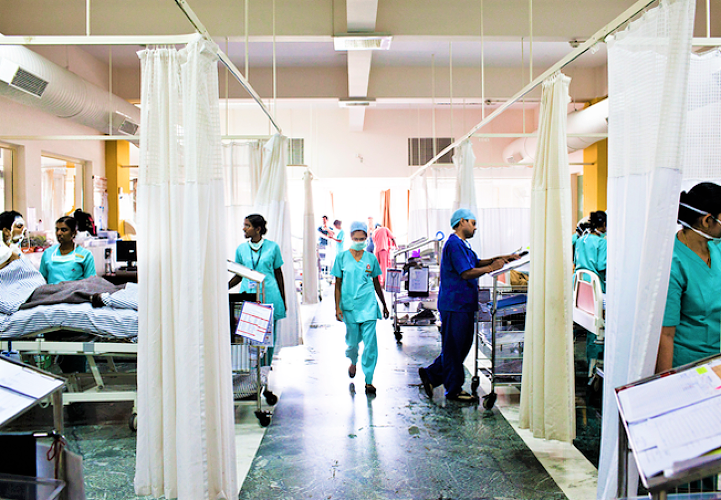
Doctors, hospitals threaten to stop the cashless treatment under govt schemes
 Low rates and delayed payments are forcing several associations of doctors, hospitals and nursing homes have threatened to stop the cashless treatment of millions of beneficiaries under the central government’s medical care schemes for its employees, pensioners and their families.
Low rates and delayed payments are forcing several associations of doctors, hospitals and nursing homes have threatened to stop the cashless treatment of millions of beneficiaries under the central government’s medical care schemes for its employees, pensioners and their families.
The warning comes as bills worth at least ₹1,000 crores under schemes like the Central Government Health Scheme (CGHS) and Ex-Servicemen Contributory Health Scheme (ECHS) remain pending, according to Association of Healthcare Providers (India) or AHPI.
At least 3.2 million people across India are covered under CGHS and 550,000 under ECHS. Dr Girdhar Gyani AHPI director-general said that the group is not saying that it will stop treating patients covered under schemes like CGHS. All they are saying is that they’ll stop providing cashless treatment. He also called it a stopgap measure to deal with the delay in payments. He added that the beneficiaries could pay for the service at the CGHS rates and then seek reimbursements from the government.
Medical associations say that special rates insurance providers have negotiated rates that are 30 – 50% lower than the regular rates, and are compounding the problem. “General Insurance Public Sector Association, an organisation formed by the four public insurance companies [Oriental Insurance, New India Assurance, National Insurance, and United India Insurance], has cartelised the market and negotiated arbitrarily low prices with hospitals for empanelment,” said All India Ophthalmological Society president-elect Dr Mahipal Sachdev, who is also the chairman of Centre for Sight chain of hospitals.
Large private hospitals like Lilavati, Hinduja, Apollo, Max, Fortis, Ganga Ram, Christian Medical College Vellore, are among at least 10,000 members of the AHPI spread across 33 states and Union Territories.
According to Delhi Voluntary Hospitals’ Forum secretary, Dr PK Bharadwaj said that there is not a single scheme under which payments are made on time. He says the wait for CGHS was at least six months. He also added that this creates a difficult situation for hospitals as they are then unable to pay the salaries, their vendors for medicines, consumables, etc. and the cycle keeps continuing.
“The Hospital [chain] signed up for schemes such as the CGHS in October 2014 on pre-negotiated or decided government rates. The scheme had a provision that 70% of a bill amount had to be cleared within five working days post submission. While that remains a distant dream, the dues pending under the CGHS over the years have led to a difficult cash flow situation for the hospitals,’’ said the spokesperson for Max Healthcare chain of hospitals in Delhi. “We are finding it difficult to cope up with this huge burden, which continues to grow by the day.”
The CGHS rates were unsustainable. Medical associations have also sought an increase in the rates provided under the government schemes, including those of the Delhi government. Poor families are provided up to ~5 lakh insurance cover annually under the Ayushman Bharat scheme.
Ayushman Bharat chief executive officer Indu Bhushan said that the rates have now been rationalised. “…we have found that the rates of some packages were higher. About a month ago, we reduced the rates of 79 packages and increased the rates of 280 packages. Now, our rates are competitive,’’ said Bhushan.
Bhushan said that they are also ensuring that payments are made on time.
“Fixing costing is a complex issue and the Ayushman Bharat rates have been based on a study by the Post Graduate Institute of Medical Education and Research, Chandigarh, and consultations with several practitioners.”
Gyani said that the government should survey its hospitals to determine the cost of each procedure, add to it the costs of land, electricity and human resources to arrive at final rates for the private sector. “Over the next three to five years, 70% of the patients going to any hospital would be under either insurance cover or some form of the government health schemes. So, where will the money come from?” he asked.
Patients’ rights groups say, while timely payment of dues is essential, the rates are not irrational. “… the CGHS rates are workable, but Ayushman Bharat rates are lower. These packages are for high volume, low margin type of operations… ,’’ said Abhay Shukla, the national convener of Jan Swasthya Abhiyan, a patients’ rights group.
Source: Hindustan Times.